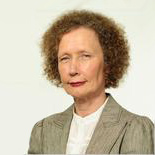 Editor’s note: In recent years vaccines have been developed to help prevent certain cancers. These include the HPV vaccine which protects against certain kinds of cervical cancers, and the hepatitis B vaccine which can help prevent certain liver cancers. Researchers continue to search for vaccines against other forms of cancer.
Editor’s note: In recent years vaccines have been developed to help prevent certain cancers. These include the HPV vaccine which protects against certain kinds of cervical cancers, and the hepatitis B vaccine which can help prevent certain liver cancers. Researchers continue to search for vaccines against other forms of cancer.
Helen Evans is Deputy CEO of the GAVI Alliance, a public-private partnership focused on saving children’s lives and protecting people’s health by increasing access to immunisation in poor countries.
I am looking forward to participating in the 2012 World Cancer Leaders’ Summit, to be held in Montreal, Canada on 27 August. This will be an opportunity to take stock of where the world is with regards to cancer prevention and treatment and to learn more about action to address the existing challenges to eliminating cancer as a life-threatening disease for future generations.
Leaders from the health, government, philanthropic and corporate sectors will come together to discuss innovative ways of reversing the global cancer epidemic and I am excited to be part of this.
Since 2000, the GAVI Alliance has made great strides in supporting low-income countries in tackling leading child killers, such as pneumonia and diarrhoea, by accelerating the roll-out of new and under-used vaccines.
When it comes to cancer prevention, I am happy to say that GAVI is also making a difference on this front. By accelerating the introduction of hepatitis B vaccines in developing countries since 2000, GAVI has helped prevent an estimated 3.7 million deaths from liver cancer (caused by hepatitis B).
GAVI’s success in rolling out the hepatitis B vaccine, the first anti-cancer vaccine, can now be potentially replicated with vaccines against the human papillomavirus (HPV), the leading cause of cervical cancer.
Women in developing countries often have little or no access to screening or treatment for cervical cancer so a vaccine that prevents HPV is even more important.
GAVI’s support for HPV vaccines will help protect tens of millions of girls from cervical cancer, which is the leading cause of cancer deaths among women in poor countries. What is most disturbing about this cancer is that it hits women in their forties and fifties when their contribution to families and childrearing is most important. And the children left behind are not only robbed of their mother but all too often have a lower chance of getting a good education and receiving adequate healthcare.
As long as GAVI can secure affordable prices from manufacturers, we expect to begin providing the vaccines to GAVI-eligible countries ready to roll them out nationally as early as 2013. Countries applying for GAVI support to run a more focused HVP demonstration project also need to show that their HPV roll-out strategy to vaccinate girls aged 9 to 13 is integrated as part of a national cancer prevention and screening plan.
With the growing focus on cervical cancer prevention, I am very hopeful that the GAVI Alliance will contribute by preventing millions of cervical cancer deaths through vaccination and ensuring that all women, wherever they are born, can be protected from this horrible cancer.





VaccinesToday (@VaccinesToday) (@VaccinesToday)
August 28th, 2012
Read guest post by Helen Evans on how @GAVIalliance is helping fight #cancer in low-income countries http://t.co/L55w8035